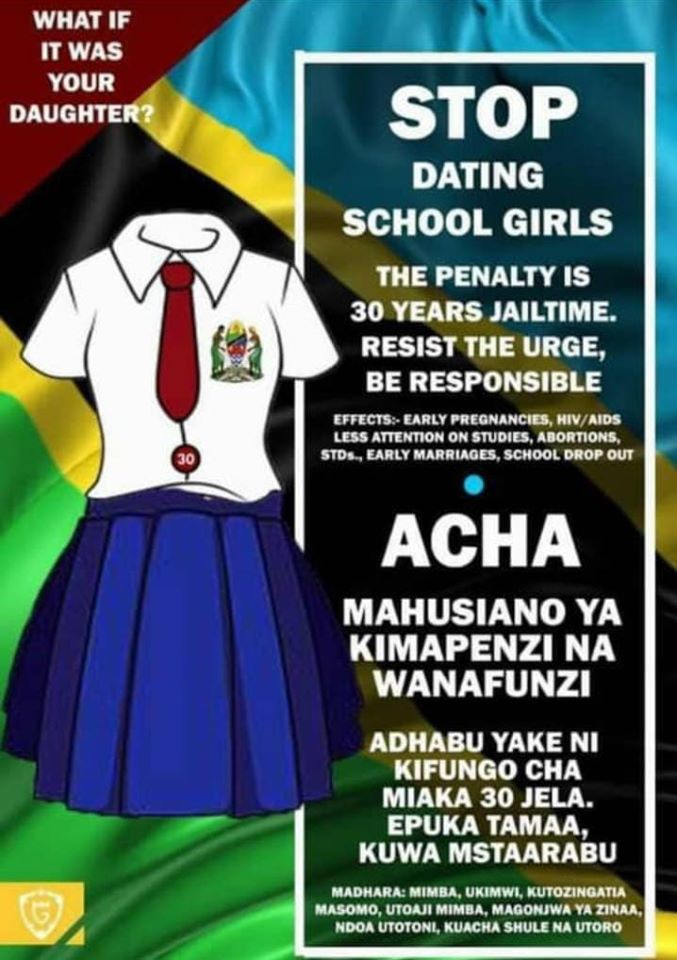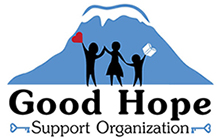Program for Teenage Mothers: Our Mabinti Project
The Mabinti project was first launched to educate, support and empower young women who are confronted with an unplanned pregnancy and the concomitant challenges. In public schools in Tanzania, teenage girls are subjected to unannounced pregnancy tests and any girl found to be pregnant is immediately expelled from school. This procedure has been actively discriminating young women for years, drastically worsening their life and their educational opportunities. As a result, teenage mothers are subjected to double oppression and marginalisation: by the school system, which aims to “educate children, not mothers”, and by their community and society, which exclude and discriminate girls because of their early pregnancy. This leads to a greatly increased risk of poverty for teenage mothers and their children.
The name of the project “Mabinti” means “girls” or “daughters”. We want to emphasise that these girls are by no means adult women, as many (male) politicians often state, but girls with their own (age-related) needs. But more importantly, we see them as our daughters. Daughters whom we want to support with help and advice.
Our Mission
Our mission is to empower young mothers to earn a living and become independent. In doing so, we are addressing an important problem faced by many young women in Tanzanian society. The young mothers receive two years of free tailoring training from us so that they can make a living from their tailoring work afterwards. We are an operational organisation, which means that we plan our projects independently and carry them out locally in order to work closely with the needs of our society – and especially the girls. This requires a great deal of careful planning, communication and commitment in the communities to ensure the success of our project.
Our further development
The Mabanti project started in 2021 with five young teenage mothers who received free tailoring training from us. The young mothers learnt how to tailor blouses, dresses and trousers from a patient and sensitive tailor teacher. Our mabinti (teenage mothers) also learnt how to sew sustainable and durable sanitary towels for menstruation. These are washable and also protect the environment. These pads are called “Binti-Pads” and we offer them to girls in primary schools in the area.
We now not only look after, support and teach teenage mothers, but also young women who have been left alone by their partner and/or family to bring up and care for their children. The (financial) burden for single mothers to care for their children while also providing for their own education or work can be overwhelming. These women often have limited access to education and work opportunities, which increases their economic dependence. In addition, the stress can have a negative impact on their physical and mental health.
Latest news
In the following we would like to introduce the two women who are currently tailoring with us on a daily basis:
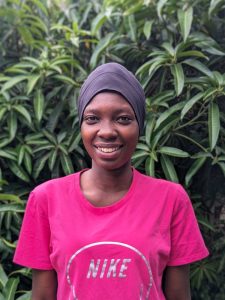
Bertha is 23 years old and has been part of the Good Hope family since the launch of the project. She became a mother at the age of 19 and learnt how to sew at Good Hope. After three years with us, she is now able to sell her self-made products to guests and Good Hope would like to occupy her as a tailoring teacher to future participants of the project.
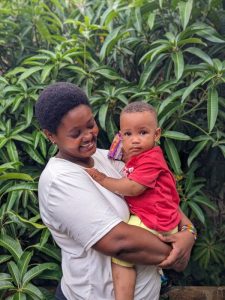
Noreen is 25 years old and looks after her one-year-old son on her own. As she is a single mum, her little one often comes to Good Hope with her. Here he can play with the other children, gets something to eat and Noreen tailors products every day that she can also sell to visitors and volunteers at Good Hope.
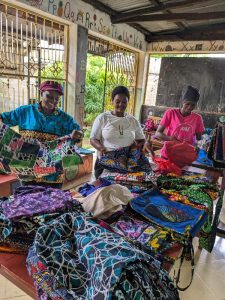
Every day we work together with the two young women on the quality of the products and develop new ideas for realisation and design. In the city, we buy various fabrics and utensils such as zippers for the bags. Here you can see Noreen and Bertha choosing fabrics at Good Hope with our director Oliver.
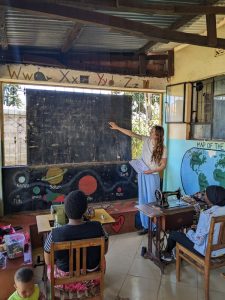 They are currently receiving English lessons once a week from one of our interns so that they will soon be able to sell their products independently. With us, they learn how to introduce themselves personally, approach customers and advertise their products.
They are currently receiving English lessons once a week from one of our interns so that they will soon be able to sell their products independently. With us, they learn how to introduce themselves personally, approach customers and advertise their products.
With the further development of the project, we have decided to welcome all women who are marginalised additionally to their discrimination as women. Good Hope is still urgently looking for donations and funding to continue this wonderful project successfully. If you would like to support us and the young women: get in touch with us.
Our vision
Our vision is to create a world in which all girls and young women in Tanzania have the opportunity to pursue their dreams and fulfil their potential despite the challenges that life has in store for them. We believe in a society where the needs, rights and dignity of young women are respected and protected and we want to actively work towards this with our project.
We strive to create a future in which young women are no longer discriminated against through unannounced pregnancy tests and expulsions from school. Instead, they should be encouraged, educated and empowered to realise their full potential. Our vision is to liberate teenage mothers and young women in Tanzania from the oppression and marginalisation that comes from lack of education and social stigma. We offer not only education, but also a supportive community. In our organisation, our participants find a network of like-minded people who are overcoming similar challenges. By sharing experiences, emotions and resources, we build a strong community that fosters mutual support and solidarity.
We are committed to the economic independence and self-determination of young mothers by offering them the opportunity to finance their lives and those of their children and families with their own tailoring work. At the same time, we teach them how to sell their products with a focus on using the English language. This focus on education and skills empowers the participants to acquire a profession that enables them to earn a sustainable income. We believe in the transformative power of education to empower women’s independence and self-confidence.
Our vision extends beyond individual support and aims to raise awareness in society as a whole to combat gender discrimination and marginalisation. We are actively committed to raising awareness in society of the challenges and experiences of discrimination faced by young mothers and marginalised women by trying to educate and sensitise as many people as possible on our website and social media channels.
By continuously developing our project, we are able to reach an even wider circle of women who are in need of support.
Implementation, Goals and Tasks
Our Mabinti programme aims to counteract the stigmatisation and resulting poverty of young mothers and their children. Our resocialisation and education programme is aimed at young mothers from Moshi between the ages of 17 and 25. The programme aims to achieve the following goals:
- Participants:in the project will be able to use their tailoring skills to earn a sustainable income
- Strengthening of the young mothers’ self-confidence, self-esteem and life skills in order to repair the emotional damage caused, counteract stigmatisation, prevent further emotional and physical exploitation and support the young women in developing a positive vision for the future. Through education, community and support, the women will develop increased self-esteem and confidence
- Participants will be surrounded by a supportive community where they can share experiences and resources. This creates a sense of solidarity and strengthens social bonds
- Providing childcare for the children to enable early childhood education, as well as time and space for the young mothers’ training
